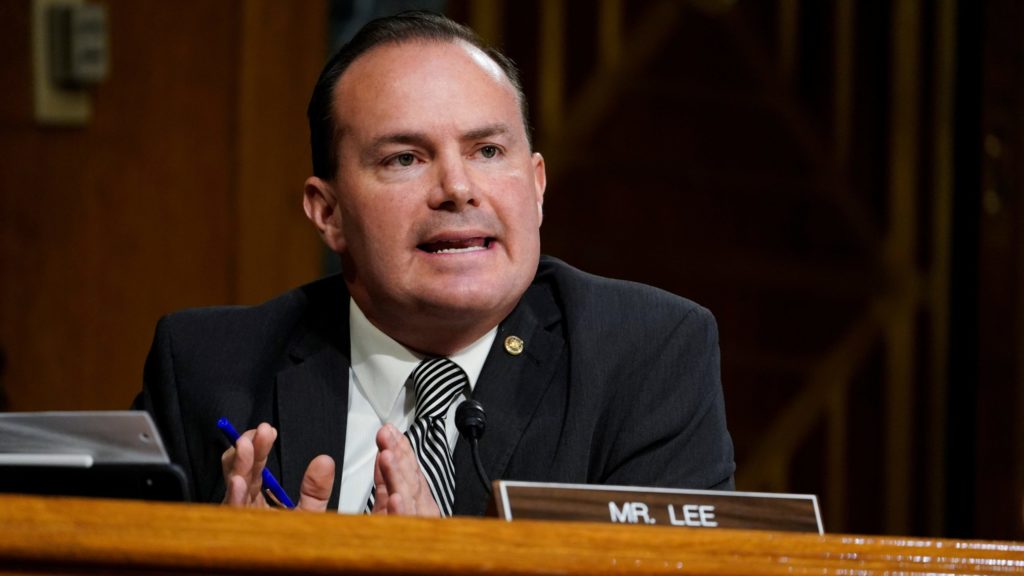Legislation recently introduced by Rep. Chip Roy, R-Texas, and 25 of his fellow House Republicans and a companion bill sponsored by Sen. Mike Lee, R-Utah, in the Senate, seeks the repeal of the 1994 Freedom of Access to Clinic Entrances, or FACE, Act, calling it an unconstitutional weaponized use of federal power.
In announcing the measure Sept. 19, Roy cited the September 2022 arrest of Mark Houck of Kintnersville, Pennsylvania. Houck, a pro-life activist for several years, was charged in two separate incidents for allegedly shoving a Planned Parenthood volunteer escort on the sidewalk outside a Philadelphia abortion clinic. A jury took only an hour to acquit Houck in January of two violations of the FACE Act.
Roy also complained the Justice Department has not used the FACE Act to prosecute church vandalism or attacks on pregnancy resource centers that have taken place since the Supreme Court overturned the Roe v. Wade decision in 2022.
In April, Roy tried unsuccessfully to have the Justice Department enforcement of the law defunded.
The repeal is unlikely to pass unless Republicans control both houses of Congress.
The FACE Act imposes serious criminal penalties -- up to 10 years in prison in the event of bodily injury, plus stiff fines -- on individuals convicted of "violent, threatening, damaging, and obstructive conduct" that interferes with access to abortion clinics.
Remarks by Rep. Chris Smith, R-N.J., a co-sponsor and co-chair of the Congressional Pro-Life Caucus, were included in Roy's statement.
Smith said the act "prescribes harsh, mean-spirited punishments when pro-life individuals engage in acts of nonviolent civil disobedience -- the staple of the human rights and civil rights movements."
He added that "peaceful actions like holding a sign, singing a hymn, or praying the Rosary, if conducted near an abortion mill, can result in jail sentences, massive fines and punitive damages by the party that feels it has been offended."
The FACE Act has proven durable in court. In the first two years after its enactment, the act was upheld by four federal appeals courts and 11 federal district courts. In 1996, the Supreme Court declined, for the third time, to hear a challenge to the law.
A Justice Department web page notes that the law "contains fairly straightforward offense language -- requiring an intentional threat of force, use of force, obstruction or damage to property."
"What is unique about the statute, however, is the motive requirement," it continues. "In addition to showing that an individual engaged in the offense conduct knowingly, the government (or a private plaintiff in some civil FACE cases) must show that an individual engaged in the offense conduct for the purpose of injuring, intimidating or interfering with persons seeking or providing reproductive health services."
Combined charges of conspiracy against rights and FACE Act offenses are the strongest action federal prosecutors have taken against clinic blockades, known as "lock and block" because activists attempt to lock gates outside and block doors inside.
The tactics, used often in the 1980s, saw a revival beginning in 2017. Conspiracy against rights charges, stemming from a civil rights law passed in 1870, allege advance planning of the blockades.
Currently, the best-known convictions from those charges are eight activists who conducted a blockade at Washington Surgi-Center in Washington in 2020 under the auspices of a group called Progressive Anti-Abortion Uprising, which includes Catholics, evangelicals and atheists.
They include Lauren Handy of Alexandria, Virginia -- Handy gained worldwide fame in 2022 for a press conference in which she admitted to storing five fetuses in a refrigerator, believed to have been aborted late term, after recovering a box of 115 from a medical waste disposal truck -- and Joan Andrews Bell of Montague, New Jersey.
Decades ago, Bell participated in Operation Rescue, and her willingness to endure long terms of incarceration, including solitary confinement, after clinic blockade and trespassing convictions made her a hero to some in the pro-life movement. She has served jail terms in Baltimore, St. Louis and Pittsburgh as well as state prison in Pensacola, Florida.
Convicted of conspiracy against rights and violating the FACE Act, the eight face up to 11 years in prison and fines up to $350,000, and await sentencing in U.S. District Court for the District of Columbia. All were incarcerated upon conviction.
Among other well-known people who have been convicted under the FACE Act, Father Fidelis Moscinski, a Franciscan Friar of the Renewal from the Bronx, is finishing up a six-month jail sentence for blocking access to a New York Planned Parenthood abortion facility on Long Island. That was part of an event planned by the Michigan-based Red Rose Rescue.
Other federal indictments for conspiracy against rights and violation of the FACE Act awaiting trial include 11 activists charged with a clinic blockade in Mount Juliet, Tennessee, in March 2021; and eight indicted in Michigan for clinic blockades in Sterling Heights in August 2020 and Saginaw in April 2021.
However, federal FACE Act charges also have been brought against abortion activists. In January, a federal grand jury indicted two Florida residents on the combined charges of conspiracy against rights and FACE Act violations. The indictment alleges the pair spray-painted "If abortions aren't safe than niether are you," "YOUR TIME IS UP!!," "WE'RE COMING for U" and "We are everywhere" on a pregnancy resource center in Winter Haven, Florida.
The indictment says the pair targeted two other Florida facilities in Hollywood and Hialeah.
The Justice Department said the activists face "a maximum of 12 years in prison, three years of supervised release and fines of up to $350,000."

